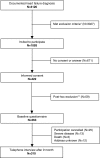Type D personality is a predictor of poor emotional quality of life in primary care heart failure patients independent of depressive symptoms and New York Heart Association functional class
- PMID: 19937107
- PMCID: PMC2813529
- DOI: 10.1007/s10865-009-9236-1
Type D personality is a predictor of poor emotional quality of life in primary care heart failure patients independent of depressive symptoms and New York Heart Association functional class
Abstract
Quality of life is an important patient-centered outcome and predictor of mortality in heart failure, but little is known about the role of personality as a determinant of quality of life in this patient group. We examined the influence of Type D personality (i.e., increased negative emotions paired with emotional non-expression) on quality of life in primary care heart failure patients, using a prospective study design. Heart failure patients (n = 251) recruited from 44 primary care practices in Germany completed standardized questionnaires at baseline and 9 months. The prevalence of Type D was 31.9%. Type D patients experienced poorer emotional (P < .001) and physical quality of life (P = .01) at baseline and 9 months compared to non-Type D patients. There was no significant change in emotional (P = .78) nor physical quality of life (P = .74) over time; neither the interaction for time by Type D for emotional (P = .31) nor physical quality of life (P = .91) was significant, indicating that Type D exerted a stable effect on quality of life over time. Adjusting for demographics, New York Heart Association functional class, and depressive symptoms, Type D remained an independent determinant of emotional (P = .03) but not physical quality of life (P = .29). Primary care heart failure patients with a Type D personality experienced poorer emotional but not physical quality of life compared to non-Type D patients. Patients with this personality profile should be identified in primary care to see if their treatment is optimal, as both Type D and poor quality of life have been associated with increased morbidity and mortality.
Figures

Similar articles
-
Type-D personality but not depression predicts severity of anxiety in heart failure patients at 1-year follow-up.J Affect Disord. 2008 Feb;106(1-2):73-81. doi: 10.1016/j.jad.2007.05.021. Epub 2007 Jul 5. J Affect Disord. 2008. PMID: 17614136
-
Type-D personality but not implantable cardioverter-defibrillator indication is associated with impaired health-related quality of life 3 months post-implantation.Europace. 2007 Aug;9(8):675-80. doi: 10.1093/europace/eum041. Epub 2007 Apr 13. Europace. 2007. PMID: 17434891 Clinical Trial.
-
Type D personality and depressive symptoms are independent predictors of impaired health status in chronic heart failure.Eur J Heart Fail. 2008 Sep;10(9):922-30. doi: 10.1016/j.ejheart.2008.07.010. Eur J Heart Fail. 2008. PMID: 18942177
-
Patient perspectives about depressive symptoms in heart failure: a review of the qualitative literature.J Cardiovasc Nurs. 2014 Jan-Feb;29(1):E9-15. doi: 10.1097/JCN.0b013e318273a5d6. J Cardiovasc Nurs. 2014. PMID: 23151836 Free PMC article. Review.
-
How are depression and type D personality associated with outcomes in chronic heart failure patients?Curr Heart Fail Rep. 2013 Sep;10(3):244-53. doi: 10.1007/s11897-013-0139-7. Curr Heart Fail Rep. 2013. PMID: 23661199 Review.
Cited by
-
The association of depressive symptoms, personality traits, and sociodemographic factors with health-related quality of life and quality of life in patients with advanced-stage lung cancer: an observational multi-center cohort study.BMC Cancer. 2020 May 18;20(1):431. doi: 10.1186/s12885-020-06823-3. BMC Cancer. 2020. PMID: 32423432 Free PMC article.
-
Demographic and psychological predictors of recovery from coronary artery bypass graft.J Educ Health Promot. 2017 Oct 4;6:92. doi: 10.4103/jehp.jehp_154_16. eCollection 2017. J Educ Health Promot. 2017. PMID: 29114559 Free PMC article.
-
Anxiety, depression, coronary artery disease and diabetes mellitus; an association study in ghaem hospital, iran.Iran Red Crescent Med J. 2014 Aug 17;16(9):e14589. doi: 10.5812/ircmj.14589. eCollection 2014 Sep. Iran Red Crescent Med J. 2014. PMID: 25593715 Free PMC article.
-
Neuroticism personality trait is associated with Quality of Life in patients with Chronic Heart Failure.World J Cardiol. 2014 Oct 26;6(10):1113-21. doi: 10.4330/wjc.v6.i10.1113. World J Cardiol. 2014. PMID: 25349656 Free PMC article.
-
Type D personality predicts poor medication adherence in patients with heart failure in the USA.Int J Behav Med. 2014;21(5):833-42. doi: 10.1007/s12529-013-9366-2. Int J Behav Med. 2014. PMID: 24198039 Free PMC article.
References
-
- Berkman LF, Blumenthal J, Burg M, Carney RM, Catellier D, Cowan MJ, et al. Effects of treating depression and low perceived social support on clinical events after myocardial infarction: The Enhancing Recovery in Coronary Heart Disease Patients (ENRICHD) randomized trial. Journal of the American Medical Association. 2003;289:3106–3116. doi: 10.1001/jama.289.23.3106. - DOI - PubMed
Publication types
MeSH terms
LinkOut - more resources
Full Text Sources
Medical

